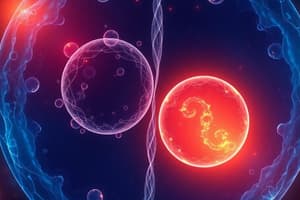Podcast
Questions and Answers
How many phases does mitosis have?
How many phases does mitosis have?
- 2
- 3
- 4 (correct)
- 5
What is the function of mitosis?
What is the function of mitosis?
Mitosis replicates somatic or body cells to grow, replace old cells, or heal itself.
What does meiosis produce?
What does meiosis produce?
Meiosis produces 4 different haploid gametes, each with 23 chromosomes.
Both mitosis and meiosis are associated with __________.
Both mitosis and meiosis are associated with __________.
Mitosis produces genetically identical cells to the parent cell.
Mitosis produces genetically identical cells to the parent cell.
Meiosis conserves the number of chromosome sets.
Meiosis conserves the number of chromosome sets.
What are some similarities between mitosis and meiosis?
What are some similarities between mitosis and meiosis?
What unique processes does meiosis have that mitosis doesn't?
What unique processes does meiosis have that mitosis doesn't?
Flashcards are hidden until you start studying
Study Notes
Phases
- Mitosis consists of four distinct phases: prophase, metaphase, anaphase, and telophase.
- Meiosis comprises all phases of mitosis, repeating the sequence twice, resulting in two rounds of cell division.
Functions
- Mitosis serves primarily in the replication of somatic or body cells, essential for growth, repair, and maintenance.
- Meiosis is responsible for producing gametes (sperm and egg cells), crucial for sexual reproduction.
Products
- The outcome of mitosis is two genetically identical diploid cells, each containing 46 chromosomes.
- Meiosis results in four genetically distinct haploid gametes, each with 23 chromosomes, contributing to genetic diversity.
Similarities
- Both mitosis and meiosis involve the breakdown of the nuclear membrane and the segregation of genetic material, followed by cell division and nuclear membrane reformation.
- Both processes are accompanied by cytokinesis, the final separation of the cytoplasm into daughter cells.
- Mitosis and meiosis occur exclusively in eukaryotic organisms.
Differences
- Mitosis maintains the chromosome number, while meiosis reduces it, halving the chromosome count in the resulting cells.
- Meiosis generates genetically unique cells, whereas mitosis produces genetically identical offspring from the parent cell.
- Unique to meiosis are processes such as synapsis (pairing of homologous chromosomes), crossing over (exchange of genetic material), the alignment of homologous pairs during metaphase, and the separation of homologous chromosomes in anaphase.
Studying That Suits You
Use AI to generate personalized quizzes and flashcards to suit your learning preferences.




